- Home
- Antonia Fraser
The Wild Island - Jemima Shore 02 Page 6
The Wild Island - Jemima Shore 02 Read online
Page 6
CHAPTER 7
There's tragedy enough
'Look, I've brought you these,' said Lachlan Stuart. In his hands was a bunch of wild roses. Their colour was more pink than red. But the symbolism remained clear. Jemima felt herself to have conceived a hatred for all roses, since her arrival in Scotland. In any case she had always hated red roses: a violent assault on the senses. She preferred bunches of white flowers: jonquils, narcissi in spring, with perhaps a touch of yellow permitted. White flowers suited the cool blues and pale greens ofher flat overlooking the trees of Holland Park where Colette was now keeping watch. Spring flowers smelt actually erotic to Jemima. People who courted Jemima Shore quickly learnt not to send anything as crude as red roses.
In any case she decided she had had enough of Captain Lachlan and his problems: it was time to strike now if her whole holiday was not to be ruined.
'Mr Stuart,' she said firmly in a voice which would have been recognized at a programme planning meeting of Megalith Television, 'I have no wish to receive these flowers from you.'
'I have come to give you a message,' Lachlan continued, paying no attention to her interruption. His tone was oddly kind. 'These flowers are a message from the Red Rose. From our Chief. We bear you no ill will. We shall protect you. You
will still be our witness. When the day of setting up the royal island comes.'
Jemima pretended not to understand the allusion.
'I don't need your protection,' she countered. 'I have no interest whatsoever in the contest you seem to be having with the Beauregard family.'
'But you must be interested in the Red Rose.' Lachlan sounded almost hurt. 'Seeing you're from the television. A reporter.' It seemed impossible at this stage to disillusion him sufficiently to explain the vast difference between the useful programmes of social comment and enquiry which Jemima Shore, Investigator, was wont to conduct, and the kind of reporter he evidently had in mind. Lachlan continued: 'Aye, but contest is the right word for it, you're correct about that. For you're knowing already about the Prince's island, I'm thinking.'
Jemima said nothing. She saw no reason to recount her brief conversation with Colonel Henry.
'The royal island,' said Lachlan impatiently. 'The Bonnie Prince Charlie Memorial. Here on the Wild Island. He told you, Mr Charles. You were to witness the setting up of it. That's why he invited you here, where no tenant has been for years. It was all part of his plan, seeing you were from television. You would make a programme about it all, and the world would see that justice had been done to the memory of the rightful King of Scotland. He wrote to you—'
'I know very little about Bonnie Prince Charlie. And I know still less about Mr Beauregard's plans for setting up a memorial to him. He certainly mentioned none of this to me in his letter...' Even as Jemima spoke, she had a sudden vision of Charles Beauregard's last letter: that scrawled handwritten postscript, whose tone contrasted oddly with the rest of the business-like formality, typed presumably by a secretary, since his original letter had been convivial, even rambling. 'PS. There is another matter concerning Eilean Fas which I should like to talk to you about personally. It can't be put in a letter.' No, indeed. If the late Charles Beauregard had really hoped for some sort of television special on his Memorial Island, he would have been sadly disappointed. She tried to imagine the reaction of the head of Megalith Television, Cy Fredericks, to her request: 'Cy, I've discovered these charming Scottish eccentrics —' 'Most exciting,' he would say. 'Most exciting. We must discuss it.' And then, without a pause. 'As we were saying about Northern Ireland ...'
Now she merely repeated more firmly than ever to Lachlan: 'The troubles of the Beauregard family, their finances, and indeed the Red Rose itself! am afraid do not concern me. No one here seems to understand that I'm actually on holiday.* The slightly desperate tone of the last remark echoed in her ears. To combat it, she stepped forward defiantly, picked up the bunch of reddish roses from the cracked, barely polished wooden table and put them on the fire. A few petals fluttered onto the carpet, worn and hardly still colourful, as she she did so. The petals lay between Jemima and the fire, like pale bloodstains, which someone had vainly tried to wash out. Neither Lachlan nor Jemima made any move to touch them.
'This is a lonely place for a woman, I'm thinking,' said the man after a long silence.
'I've never minded being lonely. In fact I've come here to be lonely,' replied Jemima. It was true. She had never minded loneliness. Her solitary upbringing, the death of both parents when she was eighteen, her struggles, the life of a successful woman with an enviable career in London: would any of this have been possible if she had been temperamentally incapable of loneliness? Those years of her affair with Cy Fredericks, gay, hectic, tortured years of her late twenties, those later so much less gay years ofher early thirties awaiting the call of the married MP, Tom Amyas... No, none of that would have been possible if she had been dominated by fear of loneliness.
Nowadays life was good. Guthrie Carlyle, if anyone, was the lonely one. But she certainly did not feel like sending for Guthrie: something about his evident willingness to be summoned at all hours of the day and night, at all seasons, so charming in a busy London life, had seemed to make his summoning unnecessary in the Highlands. Better far to beguile herself with his presentation copy of Burns, beside the fire, alone. Once, that is, Lachlan Stuart had been quickly but firmly eliminated.
'Aren't you afraid of ghosties, men ?' There was something faintly mocking about Lachlan's voice. 'If you'll no be interested in royalty. Wummin is generally afraid of ghosties.'
Jemima smiled and said, 'I'm sorry to disappoint you.' In her experience, ghosts turned out to have an all too human explanation. Beware of charms, ghosts, dreams and such like fooleries said the Catholic catechism. As Mother Agnes would say. She thought of Blessed Eleanor's Convent. Ghosts were evil manifestations in her experience, but human evil not supernatural evil.
'This is an ancient place,' said Lachlan. 'And there are ghosts here, good ghosts, bad ghosts. But you'll no avoid the ghosts at the Wild Island. That's a Druid ring yonder, they told us as boys. And Sighing Marjorie herself at the waterfall, you'll hear her voice yourself before long, above the noise of water, yearning, crying out, and other ghosts too, not so far away, ghosts they say from the wartime, the soldier killed at the falls, and now the ghost of Mr Charles, his Majesty King Charles Edward, whose memory still calls out to us. This is a Wild Island, and there are things here you from the South will never ken, but these things will not leave you in peace, even if you be from the South. There'll never be peace here till the flag of the Red Rose flies over the island, and the memory of Bonnie Prince Charlie is laid at rest. That's why you'll need to be protected.*
A strange chanting note had entered Lachlan Stuart's voice, less like the mocking note when he had first entered the room, more like the keyed-up note of his words in the church: 'Her Majesty Queen Clementina.'
And all the time the noise of water, loud, rushing water, filled Jemima's head. And behind him through the French windows, curtainless except for some tattered chintz, with their cracked and splintered woodwork, arched another rainbow. Brightly it leapt out of the soft remorseless rain which would not surrender its fall even before the many hues of the prism. The noise of the water grew louder and louder in Jemima's ears. She began to have a strange fantasy that the river was rising, invading the house, covering the island...
She thought, 'I can't stay here, I shall never sleep here with the noise of that water.' Then Lachlan's face swam before her eyes. The rainbow splintered and its violent colours dazzled and enveloped her. She knew she was going to faint.
When Jemima opened her eyes again, she was sitting in the rubbed leather armchair next to the fireplace. Outside the windows the sun was shining, catching the currents of the black river with gold. It was a delightful prospect. There was no rainbow. And no sign of Lachlan Stuart. She was quite alone.
The two whisky glasses had vanished. She began to
believe that, exhausted, slightly drunk from the whisky on an empty stomach unused to it, she had imagined the last intrusion.
'The roses,' she thought. She looked down at the hearthrug. There were no petals to be seen. The fire itself was neatly banked with logs.
She had absolutely no idea of the time. Her little gold bracelet watch, a present from Cy-she had noticed something similar on the wrists of other bright girls at Megalith from time to time-said five o'clock. That was absurd. It must have stopped during the night. She put the delicate object to her ear. The sun was shining so disarmingly: evening could hardly have arrived.
'Aye, it's a beautiful evening we have to welcome you,' said a voice from the door. 'And I've brought you a nice tea. I'm sure you're ready for it.'
It was Bridie Stuart. She was carrying a large mahogany tray. On it were piled a series of plates containing biscuits, buns and combinations of biscuits and buns, as well as a sponge cake, evidently so freshly made that it gave the impression of still softly-steaming. Within its layers were seductive glimpses of cream and jam. There was food enough on the tray for ten people.
For one horrified moment, still drugged with sleep, Jemima imagined that others might be expected -
'Och no, it's just that I looked in at lunchtime and you were fast asleep. Sleeping like a child. So, seeing you missed your nice lunch, I thought a wee cake, and some baps. With you being so thin’
Bridie put down the tray. She was a strong woman, as well as a tall one. She carried the heavy tray without visible effort. Then she knelt down and poked the fire. Questions thronged in Jemima's head. Who had rescued her from her fainting fit? Surely she had fallen onto the floor, and not thus neatly into a chair? Lachlan? His mother? Or both? She had no idea if Bridie was even aware of her son's visit.
'The flowers —' she began cautiously. Those red petals.'
Bridie looked round from the fire, positively beaming.
'I knew you'd like them,' she said with great satisfaction. 'I brought them from my little garden. Seeing as there are no flowers here at Eilean Fas.'
For the first time Jemima noticed a vase beside her. It contained a quantity of lurid but clearly home-grown roses. They were each of them a different shade of red.
'But the other petals on the hearthrug,' she persisted. 'You cleared them away?'
Bridie did not stop smiling. She dusted her apron and arose.
'Och, those flowers won't fall yet awhile,' she replied. 'Look, they're freshly picked. Not like your London flowers! Lady Edith tells me they're quite dreadful, scarcely bought but they're dead.'
, 'Your flowers are quite beautiful’ said Jemima hastily. She could not resist adding, 'Are you particularly fond of red roses?*
'I'm powerful fond of all flowers,' replied Bridie, it's just that red roses grow very strongly hereabouts. The white roses now, they won't thrive. Lady Edith Beauregard's beautiful garden, all the white roses she planted there, brought from the South from her brother's place-that's the Earl of Bournemouth, she was Lady Edith de Bourne before her marriage’ - pointed out Bridie in parenthesis, in her kindly way- 'and she's awful fond of flowers, flowers in every room, collecting wild flowers, making a garden. A real lady. Anyway they all died. In one night. It seems they were from the South .and wouldn't grow in our Scottish soil. That's what Robbie, the gardener, said. And Mr Charles, he had the famous white rose garden up at the Castle replanted with red roses.' She paused. 'No, all the roses you'll see growing in Glen Bronnack these days, Miss Shore, will be red.'
It was impossible to tell from her expression whether Bridie either approved or disapproved of the phenomenon: a valley where a white rose would not-or could hot-grow.
'Now eat, Miss Shore,' said the older woman in a kindly voice. 'These things need not concern you, you with your tea to eat.'
Jemima gave herself up to the array of Bridie's confectionery, and discovered that she was quite astonishingly hungry. Bridie continued to stand over her, talking as Jemima ate. It was clearly a situation in which Bridie rejoiced: the visitor as the grateful devourer of her wares, herself as the expositor of the ways and doings of Glen Bronnack, narrowing onto the precise details of Eilean Fas itself, and the house Tigh Fas.
As Jemima ate four baps without difficulty, Bridie gave her a quick geographical sketch. She spoke of Kilbronnack House, 'residence of the Colonel and Lady Edith, 'just outside Glen Bronnack and conveniently adjoining Kilbronnack itself.
Bridie spoke of the town too, which she described as a wonderful shopping centre, in every way superior to Inverness, and in some ways infinitely better than London, as Lady Edith herself had confirmed to Bridie. She then came to the subject of Eilean Fas, the need to be careful crossing the bridge at all times. And then she spoke of Tigh Fas, the sadness that the Estate had let the house run down, no curtains, no proper furniture, and how Jemima's unexpected appearance-'a tenant at Tigh Fas, I was awful delighted' - was thought by Bridie to herald a wonderful new era when the Estate would have to renovate the house again. She made no mention of the late Charles Beauregard's plan for a Bonnie Prince Charlie Memorial.
Finally she talked of the capricious ways of the Aga cooker which only Bridie could understand. She talked of food, food which she seemed anxious to cook for Jemima, and which she implied could be best obtained from Kilbronnack with her, Bridie's, approval, or at least connivance.
'You having no car,' said Bridie half hopefully, half accusingly. ‘And the telephone not being here, it was never worth the bother, with the house so empty. And the nearest telephone being at my house, the Black Lodge that is.'
Jemima let the point go. From the South, how delightful a Paradise without telephone or car had seemed. That mood had temporarily vanished. Something about the house was still making her uneasy: the lack of telephone or transport did not help. She would have to arrange for a car at least. But she was not prepared to discuss the subject with Bridie.
'You're very kind,' she answered. 'But I shall just be camping here. I don't really eat much myself. Besides,' she attempted jocularity, 'your tea will last me for several days.'
'But you'll be having some visitors, now ?' There was a new avidity in Bridie's voice. She pronounced the word visitors, as Colonel Beauregard had pronounced the word tenant -with a mixture of awe and something like lust.
'No visitors.' Then she compromised. 'I'm planning a new series of programmes for. the spring. I need absolute quiet.'
The mention of hallowed television led to a temporary lull in Bridie's offers; Jemima suspected it might, however, be no more than a truce.
In all this it was noticeable that one topic on which Bridie Stuart did not dwell was that of the late Charles Beauregard. Yet he had presumably been her employer - until his death. It had been made amply clear to Jemima that young Charles Beauregard, not the much older and maturer Colonel Henry, had been the owner of all this vast estate, these lodges, this
castle, this house in which she found herself. Even Kilbronnack House, Bridie made it clear, belonged to the Beauregard Estates, not to 'the Colonel perrssonally' as she put it, rolling both the r and the s. It must have been an odd feeling for the Colonel and his lady not even to own their own home...
The omission of the name of Charles Beauregard was all the more noticeable in the case of Bridie, since she spoke at such loving length concerning her own charges, the vast, in every sense of the word, family of the Colonel and Lady Edith.
'Mr Ben, aye, what a handsome lad he's grown into, he was my first baby, the flower of the flock said Lady Edith many times to me; and flower he is indeed... Mr Rory then, he's much quieter of course; indeed he's awful quiet but verra charming when you know his ways, a deep one I called him as a baby, slow to walk, verra deep, but walking verra fast when he did learn with his long legs, and of course he loves it here so much. Ah sure it's a tragedy there's no work round here. But there's no work for him in the Glen, so he has to go away to get work, travelling so often, even to London. Many's the time he's told
me: Bridie, I would do anything in the world to live here, maybe here right at Tigh Fas, after all it's empty, anything short of murder, he'd say with a laugh.'
As Bridie bustled on in her narrative to further descriptions of Hamish (slow both to read and to walk) and Gavin and Niall (slow both to read and to talk and to walk, this time, so far as she could make out, and now following useful unmemorable careers in outposts of the former Empire or the Army) Jemima brooded on Bridie's last words concerning Rory. Was it Rory ? Yes, Rory. She would never learn to tell them apart, and hoped she would never have to. But this was the second time today that a member of the Beauregard family was quoted as having spoken yearningly of murder. Death and land. 'A Glen worth killing for,' Colonel Henry had told Duncan. Rory had said of himself that he would do anything short of murder. What a primitive lot, thought Jemima with distaste. There was one thing of which she was quite positive: not all the land in the world was worth the sacrifice of a man's life.
But the line of Beauregards seemed like Banquo's descendants to stretch till the crack of doom.
'Isn't there quite a young boy as well ?' she enquired.
'Aye, that's Kim,' said Bridie. Her voice was quite doting. 'My baby. He's fifteen.'
By now the tea, the gargantuan tea, had been despatched. Bridie took the tray. Jemima followed her into the hall to the ancient kitchen with its range, like something out of a deserted mediaeval hall. Even here there were antlers, heads, lesser heads, servant class. In the hall of the house she stopped beneath one gigantic head and read the plaque:
'Shot by Charles Edward Beauregard. Cwm Fair. September 27 1930.'
For a moment the date baffled her, then she realized that the sportsman in question must have been Charles's father, Carlo. Another large plaque read: 'Shot equally by Charles Edward Beauregard and Henry Benedict Beauregard, October 2 1932.'

 Warrior Queens
Warrior Queens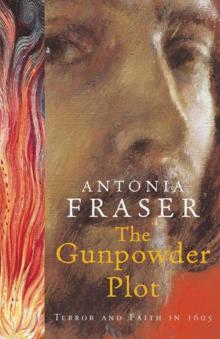 The Gunpowder Plot
The Gunpowder Plot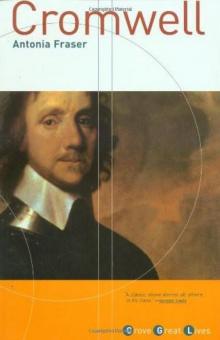 Cromwell
Cromwell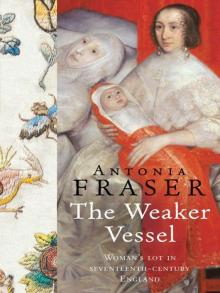 The Weaker Vessel: Women's Lot in Seventeenth-Century England
The Weaker Vessel: Women's Lot in Seventeenth-Century England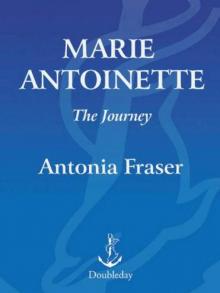 Marie Antoinette: The Journey
Marie Antoinette: The Journey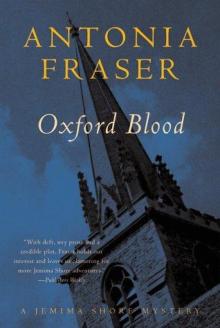 Oxford Blood
Oxford Blood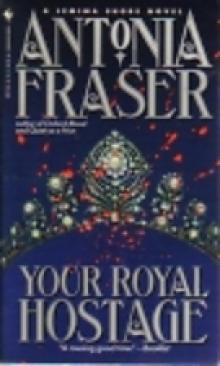 Your Royal Hostage
Your Royal Hostage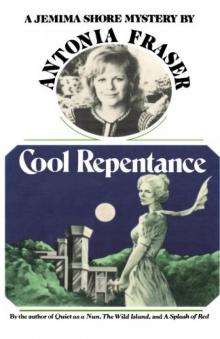 Cool Repentance
Cool Repentance Mary Queen of Scots
Mary Queen of Scots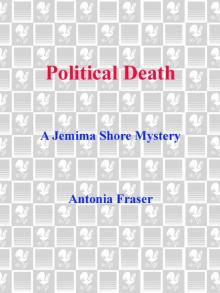 Political Death
Political Death Royal Charles: Charles II and the Restoration
Royal Charles: Charles II and the Restoration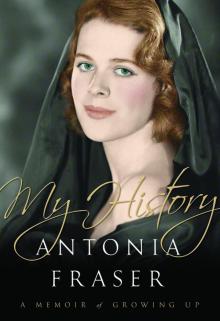 My History: A Memoir of Growing Up
My History: A Memoir of Growing Up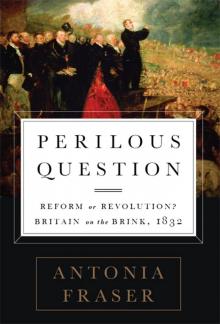 Perilous Question: Reform or Revolution? Britain on the Brink, 1832
Perilous Question: Reform or Revolution? Britain on the Brink, 1832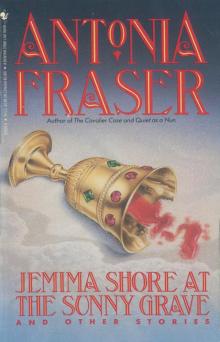 Jemima Shore at the Sunny Grave
Jemima Shore at the Sunny Grave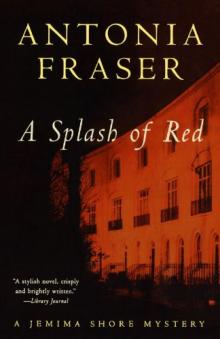 A Splash of Red
A Splash of Red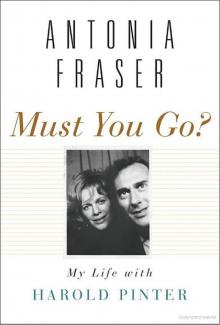 Must You Go?: My Life With Harold Pinter
Must You Go?: My Life With Harold Pinter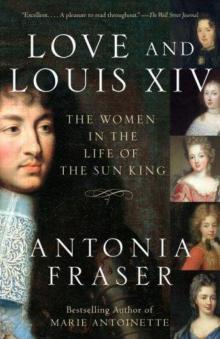 Love and Louis XIV: The Women in the Life of the Sun King
Love and Louis XIV: The Women in the Life of the Sun King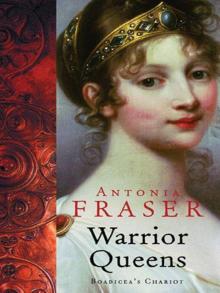 The Warrior Queens
The Warrior Queens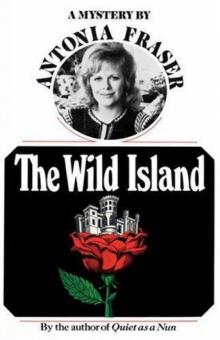 The Wild Island
The Wild Island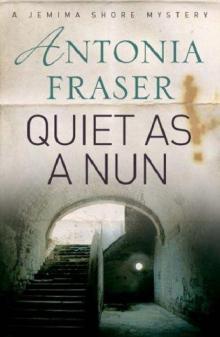 Quiet as a Nun
Quiet as a Nun Perilous Question
Perilous Question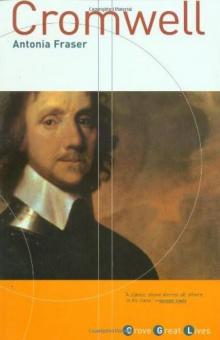 Cromwell, the Lord Protector
Cromwell, the Lord Protector Gunpowder Plots
Gunpowder Plots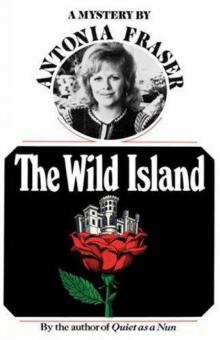 The Wild Island - Jemima Shore 02
The Wild Island - Jemima Shore 02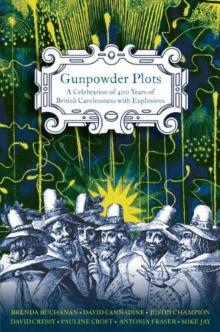 Gunpowder Plots: A Celebration of 400 Years of Bonfire Night
Gunpowder Plots: A Celebration of 400 Years of Bonfire Night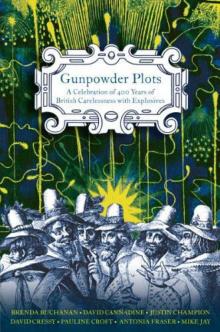 Gunpowder Plots_A Celebration of 400 Years of Bonfire Night
Gunpowder Plots_A Celebration of 400 Years of Bonfire Night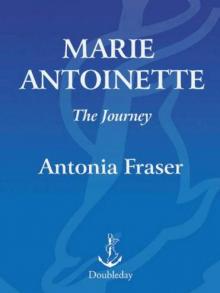 Marie Antoinette
Marie Antoinette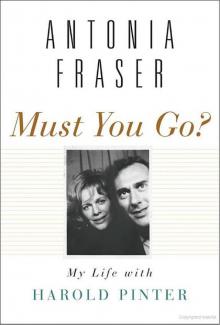 Must You Go?
Must You Go?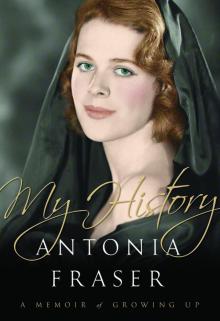 My History
My History